| Wadi Sidr | |
|---|---|
 | |
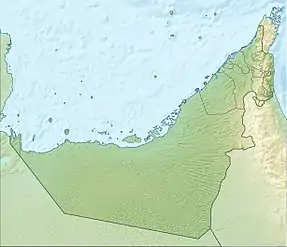 | |
| Physical characteristics | |
| Mouth | |
• coordinates | 25°25′16.9″N 56°05′48″E / 25.421361°N 56.09667°E |
Wadi Sidr is a seasonal watercourse, or wadi, in the Hajar Mountains of Fujairah, United Arab Emirates. It runs in a south-westerly direction from the village of Wadi Sidr, where it is dammed by the Wadi Sidr Dam, constructed in 2001, to the confluence of the Wadi Asimah with the Wadi Fara.
The wadi takes its name from the sidr tree, Ziziphus spina-christi, common in the Hajar Mountains and prized for the honey produced from its flowers.[1] It is a fertile agricultural area traditionally home to members of the Mazari tribe.[2] It is a popular hiking destination.[3]
Flooding
Although all of the Hajar Mountain wadis are prone to flash floods, Wadi Sidr is exceptionally so and is cited as having the highest potential for flash flooding (alongside Ain Al Faydah in Jebel Hafit) in the Emirates.[4] Wadi Sidr is also the watercourse with maximum flooding in the Emirates.[5]
Geologically, Wadi Sidr passes from areas of sedimentary rock through metamorphic and altered gabbroic rocks, complicated by thrust planes.[6]
Gallery
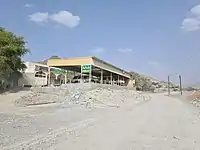 A lone Wadi Sidr grocery
A lone Wadi Sidr grocery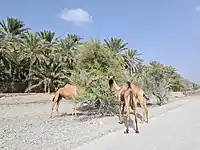 Camels feeding on ghaf in the Wadi Sidr
Camels feeding on ghaf in the Wadi Sidr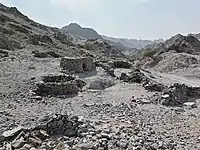 An abandoned village off the Wadi Sidr
An abandoned village off the Wadi Sidr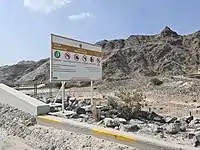 The Wadi Sidr Dam, constructed in 2001
The Wadi Sidr Dam, constructed in 2001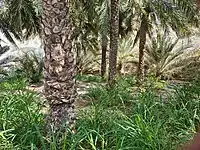 A date grove in the Wadi Sidr
A date grove in the Wadi Sidr
See also
References
- ↑ Lancaster, William (2011). Honour is in contentment : life before oil in Ras al-Khaimah (UAE) and some neighbouring regions. Lancaster, Fidelity. Berlin: De Gruyter. p. 137. ISBN 978-3-11-022340-8. OCLC 763160662.
- ↑ Lancaster, William (2011). Honour is in contentment : life before oil in Ras al-Khaimah (UAE) and some neighbouring regions. Lancaster, Fidelity. Berlin: De Gruyter. p. 532. ISBN 978-3-11-022340-8. OCLC 763160662.
- ↑ Publishing, Explorer. "Wadi Sidr & Sana". www.askexplorer.com. Retrieved 2020-11-14.
- ↑ Alsharhan, A. S. (2020). Water resources and integrated management of the United Arab Emirates. Rizk, Zeinelabidin E. Cham: Springer. p. 211. ISBN 978-3-030-31684-6. OCLC 1147260135.
- ↑ Alsharhan, A. S. (2020). Water resources and integrated management of the United Arab Emirates. Rizk, Zeinelabidin E. Cham: Springer. p. 200. ISBN 978-3-030-31684-6. OCLC 1147260135.
- ↑ Aston, ER (July 1985). "A Brief Introduction to the Geology of the United Arab Emirates". Emirates Natural History Group. Bulletin 26.